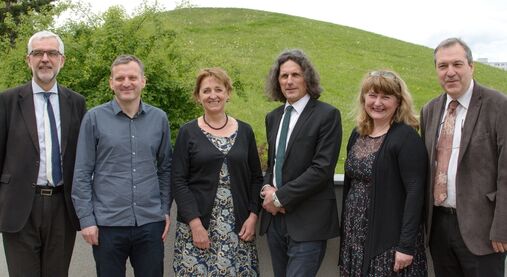Structure of the church
The ECCB is administered on three levels. The structure of the ECCB is very democratic and ensures a balanced position of clergy and laity at all levels. Each congregation has its own legal personality and administration. Within the church structure, there are rules and mechanisms that hold the whole church together and create a space for exchange and solidarity between stronger and weaker congregations.
- Local congregation (parish) - basic element of the church
- Seniorate congregation (seniorate) - made up of local congregations in a specific area (there are 14 seniorates)
- Together they form what is known as the general parish - the entire ECCB
At all three levels, there are representatives, governing bodies and a broader assembly that decides on important issues. At all three levels there are representatives, governing bodies and a broader assembly that decides on important issues. (All functions can be performed by women and men).
CONGREGATION
Managing director: Minister and curator (together)
Administrative body: Eldership (= presbytery, church council) (elected for 6 years)
Voters: Members of the congregation
Electoral assembly: congregational assembly (with a chairperson)
SENIORATE
Managing director: Senior and Seniorate Curator
Administrative body: Seniorate Committee (for 6 years)
Voters: Convent (representatives of the congregations)
Electoral assembly: Convent (with a chairperson)
GENERAL CONGREGATION
Managing director: Synodal Senior and Synodal Curator
Administrative body: Synodal Council (for 6 years)
Voters: Synod (representatives of the Seniorates)
Electoral assembly: Synod (with a chairperson)
In addition to congregational life, the church also runs social welfare organisations and schools as part of the Protestant Academy. It manages properties, runs recreation centres and forms a personnel fund to finance the salaries of ministers. It supports work with various age groups.
To support the congregations, an annual collection is organised for the Jeronýmova Jednota (‘Jerome Unity’) funds for the renovation of buildings, and reimbursements from the state finance smaller projects of the congregations and the Seniorate via the ‘Diakonických a rozvojových projektů’ (DARP - Diaconia and Development Projects) project.
General congregation - Management
1) Synod
The Synod is the supreme legislative and governing assembly (parliament) of the Evangelical Church of Czech Brethren. It is made up of 74 elected delegates from the individual elderships (half clergy and half laity) and the Protestant Theological Faculty of Charles University. In addition, it appoints advisors to each meeting, who are usually experts in specific areas of church work, employees of the church headquarters or former members of the church leadership. The synod meets once a year in May and decides on the future direction of the church. It elects a Synodal Council from among its members.
2) Synodal Council
The Synodal Council is the highest administrative body of the Evangelical Church of Czech Brethren and is elected by the Synod for a term of six years. It is made up of six members (three clergy and three laity). It is headed by the highest representatives of the church: the Synodal Senior (clergy) and the Synodal Curator (layperson). Meetings are held every fortnight in Prague. The SR uses the central church office for its activities.
3) Central Church Office
The Central Church Office supports the Synodal Council in the fulfilment of its tasks by dealing with matters decided by the Synod, the needs of the congregations and the activities of the advisory centres. It is formed by the Synodal Council from specialists in the various areas of church work.
The Central Church Office of the Evangelical Church of Czech Brethren is located in Hus House at 9 Jungmannova Street in Prague 1. The idea of creating a religious and spiritual centre for Czech Protestants in Prague was first proposed by students in the 1890s. However, the idea was far from being realised. It was not until 1912 that two houses with a large courtyard were purchased in Jungmannova Street (originally a medieval house that was remodelled in the Renaissance and Baroque styles).
In 1923, the reconstruction of the then two-storey house began according to the design of architect Bohumír Kozák, and on 1 May 1924, the Hus House was inaugurated, with a statue of Master Jan Hus by sculptor Jan Ladislav Kofranek and symbols of the Bible and a lamb on its façade. At the time, the house was not only the seat of the synodal council, but also contained rooms for meetings and accommodation for students and guests.
In the 1930s, the architect Kozák designed a new courtyard wing. The construction was completed in 1937. A large hall was built and offices and archives were added. The Hus House was temporarily a dormitory for students, the seat of the Comenius Theological Faculty (today the Protestant Theological Faculty of Charles University) and the seat of the ECCB Diaconia. The Protestant bookshop Kalich, which is still located there today, was also founded at this time. The church boarding house was also located at the same address, which has been rented to a private company since the completion of the renovation in 2023.
The building is protected as a cultural monument of the Czech Republic.


